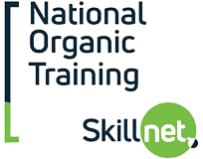Why We Chose Galloway Cattle – A Conversation with Cluainview Farm
- July 31, 2019
- Posted by: admin
- Category: News
Ahead of our Biological Farm Walk at Cluainview Farm in County Kilkenny this Saturday August 3rd, Stephen O’Reilly outlined his reasons for breeding Galloway Cattle on his farm.
Cluainview Farm is a low input, grass based & sustainable cow/calf operation using regenerative planned grazing management with an emphasis on animal husbandry & stockmanship.
Here at Cluainview Farm, we didn’t inherit a cow herd, so it left us with some decisions to make regarding the type of cow we wanted to run and why. We knew we wanted to keep whatever we ran traditional. We knew we wanted our stock to look after themselves, and to be extremely low-input, easy calving, and no fuss. Hardiness and animals being versatile was a must!
 With that in mind, our experience was mostly based on Angus and Angus-cross animals, and we didn’t like how the breed was going with it’s Canadian bloodlines and calving issues that would have been once rare with Angus cattle. So, we didn’t see our future there. We also looked at Irish Moiled, Shorthorn and traditional Hereford types, but when compared to Galloways, they all fall short of just how low input we needed our stock to be. So we settled on Belted and black Galloway females and began growing a closed herd, changing herd bulls after every two breeding seasons.
With that in mind, our experience was mostly based on Angus and Angus-cross animals, and we didn’t like how the breed was going with it’s Canadian bloodlines and calving issues that would have been once rare with Angus cattle. So, we didn’t see our future there. We also looked at Irish Moiled, Shorthorn and traditional Hereford types, but when compared to Galloways, they all fall short of just how low input we needed our stock to be. So we settled on Belted and black Galloway females and began growing a closed herd, changing herd bulls after every two breeding seasons.
Galloway cattle tick all the boxes for our operation at Cluainview Farm! These hardy beasts take no looking after, no meal and no vet bills! They are practically oblivious to any weather no matter the extremes, due to their double haired coat made up of a mossy under coat similar to beaver fur, and then their outer coat made up of long guard hairs that protects their under coat and repels rain! These characteristics in coat and hardiness are almost identical to only Bison.
Their grazing ability to forage and browse while consuming weeds that other cattle breeds simply won’t eat, is also unmatched and this was an important deciding factor for us managing our farm regeneratively. These robust cows take no training and will happy graze down docs and rushes and other stubborn undesirables most farmers dread!
Galloways make great mothers and are incredibly easy calving! They give birth to winter-storm ready newborn calves that don’t hang about getting to the milk bar!
Out of all their attractiveness and capability, to produce a healthy vigorous calf that is up in seconds with a great will to get moving across country, is the most important reason for us to keep these animals on this place and not try replace them with more mainstream cattle that just keep wanting supplies from the Co-op! The reality is that the Galloway is born for hardship and will get fat on a slab of limestone! Everything about them is made for capitalising on whatever environment they find themselves in. This is good for them, good for the farmer and really good for the environment!
From a 100{3adc6a1018460a6005a2385c2e21b7e2663bd93d2376baf481e02840920176ea} grass-fed point of view, and balancing the farm books with a system like that, we would confidently proclaim that not another breed comes within a country mile of the Galloway and Belted Galloway cow! They just don’t take minding and produce beautiful well marbled beef due to the fact of their double coat protecting their meat where other breeds use excess fat to make up for their lack of dense coat.
The Galloway cow’s ability to crossbreed from allows them to be of interest for the commercial outfit. This year we decided to run a white Shorthorn bull with the purebred Galloway females with a goal to produce Bluegrey Galloway types. This will be the beginning of a commercial herd for the farm with the plan to change from a Galloway bull to a Shorthorn or traditional Hereford bull every two breeding seasons and then returning once again to a Galloway bull. The ultimate goal of this is to produce a commercial animal with all the benefits of the Galloway breed to sell on to suckler farmers so that they can experience for themselves the reasons why these cattle are such sustainable bovines without the beef farmer having to take the plunge by going down the pedigree road.
The beef industry is going through choppy waters right now, but we really feel very positive regarding the route we have chosen and the future of our humble cow/calf operation!
We couldn’t be happier with our choice of critter, and we can stand over the fact that whatever our issues on the farm, the cattle ain’t one of them!



